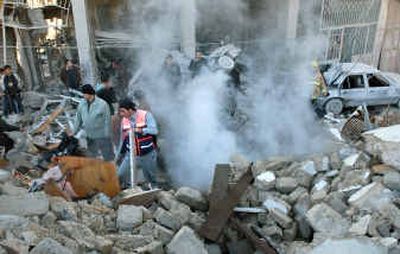Sharon ends 5-day ban on contacts with Abbas

JERUSALEM – Israeli Prime Minister Ariel Sharon on Wednesday reversed a 5-day-old ban on official contacts with the new Palestinian government, a gesture that appeared to signal approval of steps taken to stem attacks by militant groups.
So far, however, there has been little sign of progress in talks in the Gaza Strip between Palestinian Authority President Mahmoud Abbas and Palestinian armed factions. Abbas is hoping to strike a truce with groups such as Hamas and Islamic Jihad rather than having to forcefully confront them.
Abbas also told commanders of the Palestinian security forces to send troops into Gaza areas from which militants have been firing homemade Kassam rockets at Israeli towns and lobbing mortar shells into Jewish settlements in Gaza.
The senior Palestinian security chief in Gaza, Maj. Gen. Abdel Razek Majaydeh, said late Wednesday that a deployment near the coastal strip’s boundaries with Israel would begin within two days. However, commanders at several security posts said Wednesday that they had not been given instructions, and no major deployments were observed.
Palestinians were preparing for one of the major holidays of the Muslim calendar, the Eid al-Adha, which begins today. Most Palestinians spend the three-day celebration visiting family members, which could slow any moves to implement Abbas’ orders.
Palestinian commanders also are reluctant to send their forces into volatile border areas where they could draw fire from Israeli troops who mistake them for militants. Israel’s Channel One reported Wednesday night that the Israeli army’s Gaza commander and a senior Palestinian security official were discussing ways to prevent that.
The decision to restore contacts with Abbas’ government was made at a meeting of Sharon’s so-called inner Cabinet, a circle of his closest military and policy advisers.
Sharon had ordered a severance of ties last week on the eve of Abbas’ inauguration after three Palestinian militant groups claimed responsibility for an attack on the main Gaza commercial border crossing that killed six Israelis.
A senior Israeli official, who requested anonymity, said the restoration of contacts was meant as a gesture to Abbas, who says he wants to negotiate a peace accord with Israel. The 69-year-old leader was elected Jan. 9 to replace the late Yasser Arafat, with whom Israel refused any dealings during the last 2 1/2 years of his life.
Sharon aides noted that Abbas had not yet secured any promises of a cease-fire from the militant groups, but also that he had not been explicitly rebuffed – even by Hamas. The militant group claimed responsibility for a suicide bombing at an Israeli checkpoint inside Gaza on Tuesday night, less than two hours after Abbas arrived in the territory for talks.
A field agent for Shin Bet, Israel’s domestic security agency, was killed in the blast.
Even while the Palestinian truce talks continued for a second day Wednesday, violence persisted in Gaza.
Israeli troops shot to death two Palestinian men described as militants who approached the territory’s border fence, and two Israeli soldiers were hurt when militants fired an antitank rocket at an armored bulldozer in northern Gaza.
Israeli Foreign Minister Silvan Shalom said the government was not willing to wait indefinitely for Abbas to secure some form of truce with the militants.
“The timetable is limited,” Shalom told Israeli television. “There is a window of opportunity, but this could change very rapidly.”
Israeli military commanders have said they are weighing options in Gaza that may include a full-scale military takeover of the coastal strip in order to halt the firing of rockets and mortar shells. However, the same commanders acknowledge that such a wide-ranging operation will probably cost the lives of many Israeli troops and Palestinian civilians.
Sharon’s government intends to uproot the 21 Jewish settlements in Gaza this summer, and militant groups have stepped up attacks before that expected move, apparently so they can claim to have driven Israel out.
Although security matters have been Abbas’ most immediate and pressing concern, the Palestinian public, along with international donors, also expect him to curb corruption that was rampant during the Arafat era.
News reports and Palestinian officials said Wednesday that since taking office, Abbas had dismissed dozens of members of Arafat’s staff, many of whom held patronage jobs that carried no real duties.
Although about 50 advisers to the late leader reportedly were fired, Arafat’s office in the West Bank city of Ramallah still employs hundreds of people, and many of his close associates still hold senior government posts.